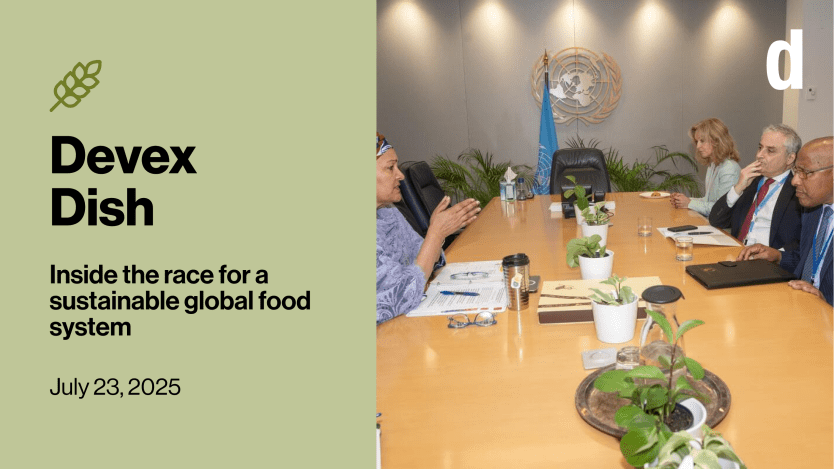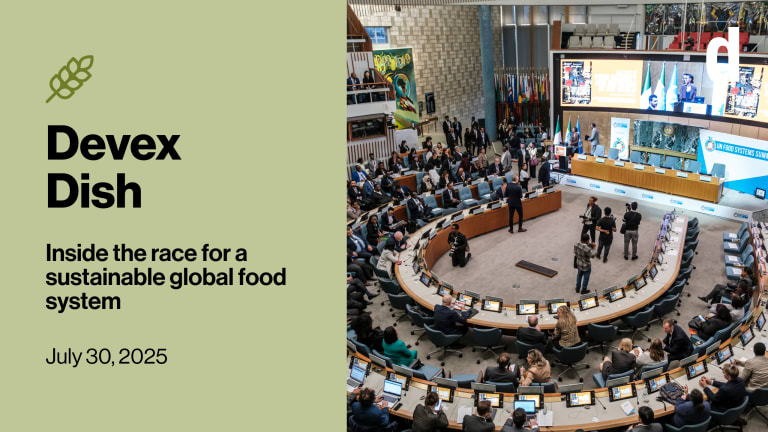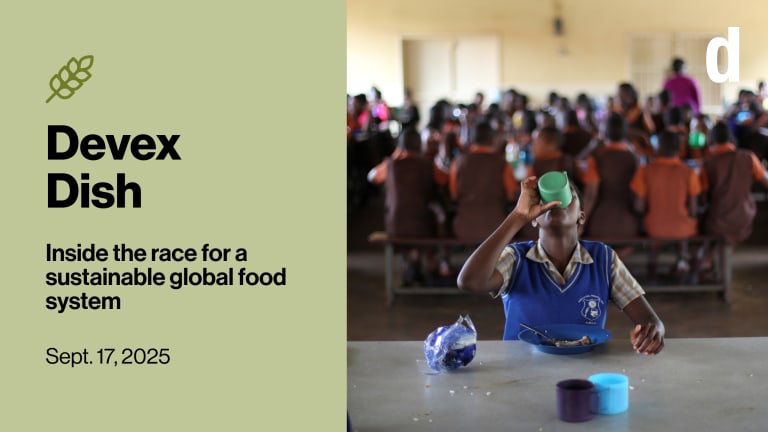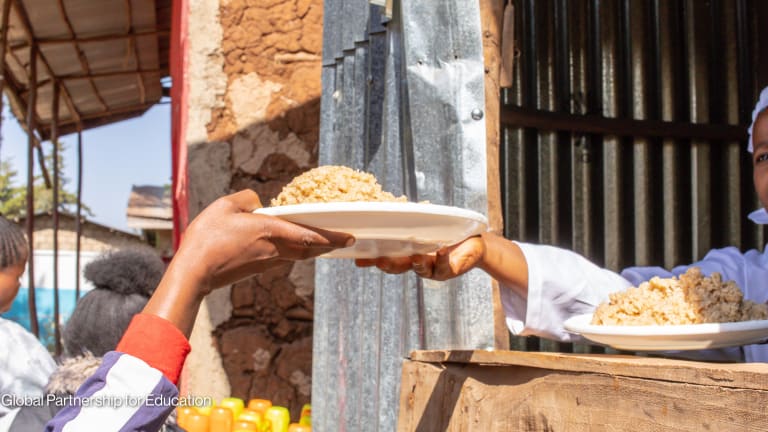
Four years after the first United Nations Food Systems Summit launched a global push to overhaul how the world produces, distributes, and consumes food, around 3,000 delegates are heading to Addis Ababa, Ethiopia, next week to take stock. Co-hosted by Ethiopia and Italy, the second biennial “stocktaking moment” — or UNFSS+4 — will assess national-level efforts to build food systems that are more efficient, inclusive, resilient, and sustainable.
The stakes are high: Transforming food systems is central to achieving U.N. Sustainable Development Goal 2 — ending hunger, improving nutrition, and promoting sustainable agriculture by 2030. Advocates say it’s also essential to unlocking broader progress on the full SDG agenda, from poverty reduction to climate action.
But this isn’t an accountability summit — and as financing gaps widen and civil society groups voice frustration over corporate influence and a lack of transparency, the question hanging over Addis is whether transformation is really taking hold, or stuck in planning mode.
Stefanos Fotiou, director of the U.N. Food Systems Coordination Hub, which organizes the event, lays out three core priorities for the meeting: tracking progress, scaling up finance, and strengthening partnerships.
On the first point: “Governments have started to walk the talk of the food system transformation,” he says, noting that more than 120 countries have developed national pathways, or country-led strategies, to transform their agrifood policies in alignment with SDG2. Many are now integrating food systems into their development plans and budgets, he adds. David Nabarro, strategic director of the 4SD Foundation, echoes this idea: “Food is too important politically. We can’t leave it to one ministry,” he tells me, citing recent progress in Uganda.
Finance is next on Fotiou’s list. “We need to hear finance commitments from the private sector,” he says, adding that while sustainability has become a popular narrative, real change will only come with matching resources. Nabarro says he expects to see “extensive engagement from development banks” — a necessity, given tightening public budgets.
Finally, partnerships. For Fotiou, success in Addis means seeing real collaboration take shape. “We need to see operationalization of the way that academia is working with the governments, the way that the private sector is working with stakeholders, the way that the farmers are working with corporations,” he says.
But the role of corporations — and broader questions of power — remain a flash point. The autonomous Civil Society and Indigenous Peoples’ Mechanism of the U.N. Committee on World Food Security, which brings together organizations representing more than 380 million people globally, has announced it will boycott the summit, citing a lack of safeguards against corporate influence and an “extractive neoliberal model” that ignores structural issues. The group also criticized the summit for omitting urgent crises, including the severe and widespread hunger in Gaza, and flagged what it sees as growing attacks on human rights defenders, shrinking public aid, and the criminalization of Indigenous movements.
Still, some disagreement is to be expected in a process this broad and politically charged. “But that’s what you have to do with systems work … You need to create a big enough tent in which the actors can come together,” Nabarro says. ”An awful lot of these issues that we're dealing with in food, you don't totally solve them ever, but you move forward in ways that help you take account of different positions.”
That’s part of what makes this summit different, he adds. Unlike other sectors with more standardized blueprints — say, renewable energy or global health — food systems are deeply contextual. “Instead of being a check to see how close people are to the right way as assessed by experts,” Nabarro says, “it's instead saying: ‘How are different people in different settings dealing with the numerous challenges around this?... And what can they learn from each other?’”
Background: Inside the UN hub carrying on the Food Systems Summit agenda (Pro)
+ Curious about the insights that drive global development? Experience Devex Pro with a 15-day free trial. Explore expert analyses, unlock hidden funding opportunities, connect with key players at exclusive events, and access a wealth of knowledge you won’t find anywhere else. Check out some of the content exclusive to Pro readers.
The secret sauce is school lunch
Sara Farley, vice president of the global food portfolio at The Rockefeller Foundation, urges leaders gathering in Addis to focus on an often overlooked tool for food systems transformation: school meals.
“School meals are one of the most powerful safety nets we have for child health and education; they are also an untapped lever for transforming our food systems if they are designed with a twin emphasis on farmers and on the children who eat the food they grow,” she writes in an opinion piece for Devex.
Farley argues that when governments align procurement with climate-smart agriculture, they can drive multiple outcomes at once — job creation, nutrition of our most vulnerable people, farmer well-being, and increased resilience. Guaranteed markets give farmers the confidence to adopt regenerative practices, she says, and school meal budgets — which already make up a large share of public food spending — can be a key lever.
She highlights Brazil’s national school feeding program, which mandates that at least 30% of ingredients come from smallholder family farms and rewards agroecological production. São Paulo aims to source 100% of school meals this way. South Korea offers another model through its universal free, eco-friendly school lunch program, linking eco-certified farms to schools nationwide.
“Food, health, climate, equity, and the economy are not separate challenges — they are one tangled problem with a common solution,” Farley writes. It’s time, she says, to stop working in silos — and build food systems that “serve farmers, nourish families, and heal the planet.”
Opinion: What we feed our children can fix our planet
Related: Inside Indonesia’s plan to feed 83 million people for free
Rescissions, reductions, and rotting rations
As the Trump administration cuts foreign food and agricultural aid, it’s worth remembering how those investments benefit American consumers and farmers. That was the message from a panel of experts at a Devex Pro Live event on Monday.
The U.S. government purchases billions of dollars’ worth of American-grown wheat, corn, and soybeans to send abroad as food aid via programs such as Food for Peace Title II. But the U.S. also benefits from investments it makes in agricultural productivity and infrastructure in lower-income countries — as they can then become markets for U.S. trade, explained Stephanie Mercier, senior policy adviser at the Farm Journal Foundation.
Bringing home the bacon
Your next job?
Director of International Foundations, Organizations and Institutions
Feed the Children
Belgium | United Kingdom | Kenya | Tanzania | Malawi | Uganda | Western Europe | Eastern Africa | West Africa
That’s why cutting programs such as Food for Peace, a USAID-run initiative that aimed to reduce poverty and hunger by strengthening food security, is counter to U.S. interests, said Dina Esposito, who, until January, ran USAID’s Bureau for Resilience, Environment, and Food Security. Little, if any, of the bureau’s work has been carried over to the State Department as it takes over what remains of USAID.
Meanwhile the State Department is undergoing a sweeping reduction in force, with nearly 3,000 staff set to depart — including more than 1,100 civil servants and 250 foreign service officers on domestic assignments, my colleague Elissa Miolene reports. The cuts represent a roughly 15% cut to the agency’s American workforce.
On Capitol Hill, Democrats are demanding answers, grilling Deputy Secretary of State for Management and Resources Michael Rigas over how the layoffs were carried out and why experienced diplomats including veterans and multilingual staff were among those let go, my colleague Anna Gawel writes.
Also drawing scrutiny: The reported expiration and planned incineration of 500 metric tons of food aid — enough to feed 1.5 million children for a week — that were originally intended for Afghanistan and Pakistan. The food, left to expire imminently amid foreign aid freezes, will now cost $130,000 to destroy. Rigas said he was “distressed” by the reporting but could not explain why the aid wasn’t distributed, while also questioning the accuracy of the news.
Watch: A successful US food aid program needs agriculture investment, experts say (Pro)
Don’t miss our latest coverage on the changing face of U.S. foreign aid:
• State Department fires thousands in mass reduction in force.
• Democrats demand answers on how US State Department firings went down. (Pro)
• Senators slam Trump official over expired food aid.
+ Check out our lineup of upcoming briefings with sector leaders, influencers, and policymakers. Today at noon ET, we’ll be having a live session with Gates Foundation CEO Mark Suzman. It’s free to register for all Devex community members. You can also send your questions in advance to editor@devex.com.
Number munching
89%
—That’s how much onion prices spiked in India last year after a searing heat wave, according to a new study led by the Barcelona Supercomputing Centre. The research highlights how climate shocks are directly driving up the cost of everyday staples. European olive oil prices jumped 50% following two years of drought in Spain, while heat in South Korea sent cabbage prices soaring by 70%.
Chew on this
More than 100 NGOs have made an urgent plea to allow lifesaving aid into Gaza as mass starvation spreads and they witness their own colleagues and partners “waste away before their eyes.” [Save the Children]
The Global Environment Facility is rolling out new wildlife conservation bonds across 54 African countries with an investment of $150 million, which it hopes to leverage up to $1.5 billion that will go toward protecting endangered species and ecosystems without adding to national debt. [Reuters]
How Ireland’s “mediocre” milk powder made it big in West Africa. [DeSmog]
Forgotten “weeds” prove a culinary hit in Kenya. [BBC]








